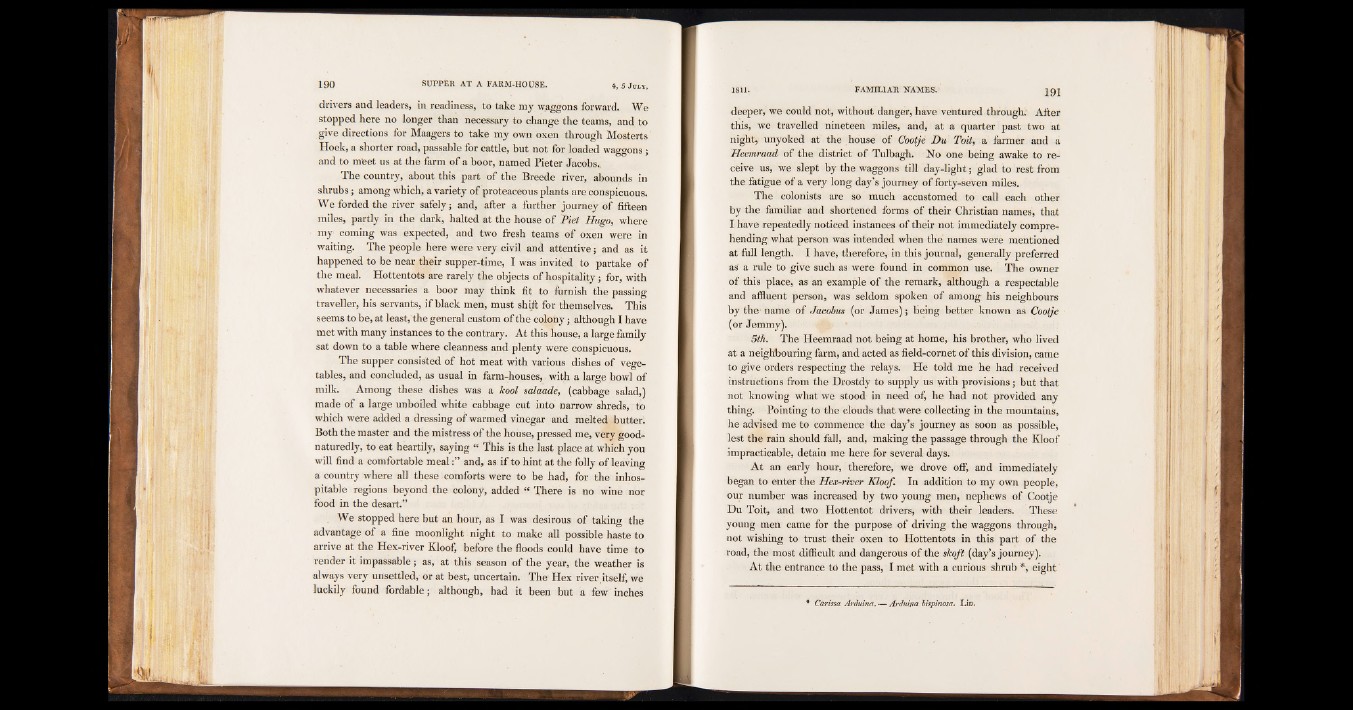
drivers and leaders, in readiness, to take my waggons forward. We
stopped here no longer than necessary to change the teams, and to
give directions for Maagers to take my own oxen through Mosterts'
Hoek, a shorter road, passable for cattle, but not for loaded waggons;
and to meet us at the farm of a boor, named Pieter Jacobs..
The country, about this part of the Breede river, abounds in
shrubs; among which, a variety of proteacepus plants are conspicuous.
We forded the river safely; and, after a further journey of fifteen
miles, partly in the dark, halted at the house of Piet Hugo, where
my coming was expected, and two fresh teams of oxen were in
waiting. The people here were very civil and attentive; and as it
happened to be near their supper-time, I was invited to partake of
the meal. Hottentots are rarely the objects of hospitality; for, with
whatever necessaries a boor may think fit to furnish the passing
traveller, his servants, if black men, must shift for themselves. This
seems to be, at least, the general custom of the colony; although I have
met with many instances to the contrary. At this house, a large family
sat down to a table where cleanness and plenty were conspicuous.
The supper consisted of hot meat with various dishes of vegetables,
and concluded, as usual in farm-houses, with a large bowl of
milk. Among these dishes was a kool salaade, (cabbage salad,!
made of a large unboiled white cabbage cut into narrow shreds, to
which were added a dressing of warmed vinegar and melted butter.
Both the master and the mistress of the house, pressed me, very good-
naturedly, to eat heartily, saying “ This is the last place at which you
will find a comfortable m e a l a n d , as if to hint at the folly of leaving
a country where all these comforts were to be had, for the inhospitable
regions beyond the colony, added “ There is no wine nor
food in the desart.”
, We stopped here but an hour, as I was desirous of taking the
advantage of a fine moonlight night to make all possible haste to
arrive at the Hex-river Kloof, before the floods could have time to
render it impassable; as, at this season of the year, the weather is
always very unsettled, or at best, uncertain. The Hex river.itself, we
luckily found fordable; although, had it been but a few inches
deeper, we could not, without danger, have ventured through.’ After
this, we travelled nineteen miles, and, at a quarter past two at
night, unyoked at the house of Cootje Hu Toit, a farmer and a
Heemraad of the district of Tulbagh. No one being awake to receive
us, we slept by the waggons till day-light; glad to rest from
the fatigue of a very long day’s journey of forty-seven miles.
The colonists are so much accustomed to call each other
by the familiar and shortened forms of their Christian names, that
I have repeatedly noticed instances of their not immediately comprehending
what person was intended when the names were mentioned
at full length. I have, therefore, in this journal, generally preferred
as a rule to give such as were found in common use. 1116 owner
of this place, as an example of the remark, although a respectable
and affluent person, was seldom spoken of among his neighbours
by the- name of Jacobus (or James); being better known as Cootje
(or Jemmy).
5th. The Heemraad not being at home, his brother, who lived
at a neighbouring farm, and acted as field-cornet of this division, came
to give orders respecting the relays. He told me he had received
instructions from the Drostdy to supply us with provisions; but that
not knowing what we stood in need of, he had not provided any
thing. Pointing to the clouds that were collecting in the mountains,
he advised me to commence the day’s journey as soon as possible,
lest the rain should fall, and, making the passage through the Kloof
impracticable, detain me here for several days.
At an early hour, therefore, we drove off, and immediately
began to enter the Hex-river Kloof. In addition to my own people,
our number was increased by two young men, nephews of Cootje
Du Toit, and two Hottentot drivers, with their leaders. These
young men came for the purpose of driving the waggons through,
not wishing to trust their oxen to Hottentots in this part of the
road, the most difficult and dangerous of the shaft (day’s journey).
At the entrance to the pass, I met with a curious shrub *, eight
* Car issa Arduina. — Arduina bispinosa. Lin.